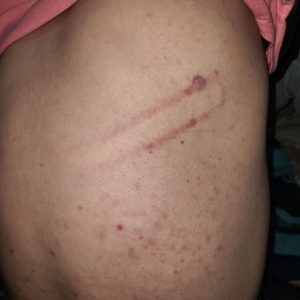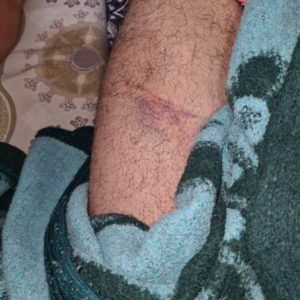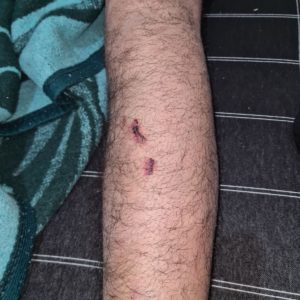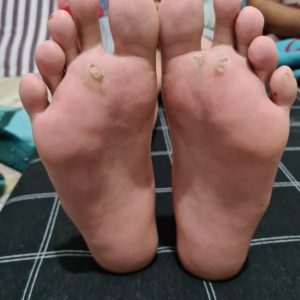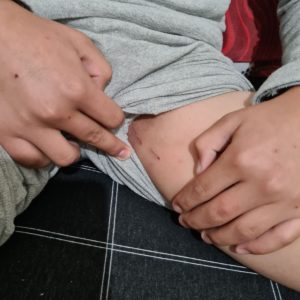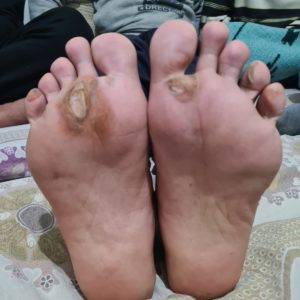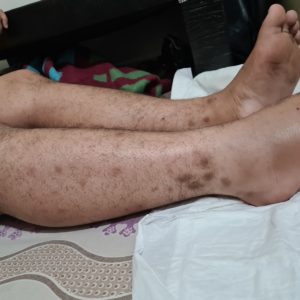This report involves people from the same initial transit group mentioned in the testimony “They don’t ask us anything, they just used us as pawns”. The original transit group was separated both during apprehension as well as after the pushback from Greece to Turkey when individuals of the group were forced back onto Greek territory by Turkish officers.
This testimony, given from a Syrian man travelling with the transit group, describes the event from the perspective of the group that was not forced back to Greece.
On April 25th, a group of seven crossed into Greece by the Greek-Turkish land border, through the Evros/Meric river close to Soufli. The group was composed of two people from Iraq and five persons from Syria, four of which were related to each other. Two of the Syrians were minors, 12 and 14 years old, and were traveling without their parents but with extended family members.
Once in Greece, they continued their way on foot. The respondent reported they were hiding in the woods, walking at night, and resting in hiding by day. They rationed their food to last 20 days while they continued their journey. They reportedly walked slower than expected, and ran out of food before expected, so they decided to risk buying groceries in a supermarket in Arriana. The respondent recalled being surprised to see that the man working at the supermarket treated them nicely and did not call the police.
According to the respondent, the 14-year-old Syrian boy has an uncle living in Athens with refugee status. The boy has severe scoliosis and has 14 metal screws in his body, so the uncle was eager to pick him in order to prevent him from straining his health too much, as well as to prevent a pushback, explained the respondent. He reportedly reached out to a lawyer who then alerted several journalists and reached out to some NGOs in the area with the aim of preventing a pushback.
The UNHCR hotline, Médecins Sans Frontières (MSF), Greek Council for Refugees (GCR), ARSIS, and several other smaller NGOs were alerted.
The respondent reported that on May 6th, the uncle and his lawyer picked up the 14-year-old nephew near the village of Gratini, while the rest of the group continued walking towards Thessaloniki.
In the early morning of May 9th, the uncle, who had by then returned back to Athens, reportedly lost contact with the rest of the transit group. According to the respondent, their last location was between Xanthi and Komotini, close to the village of Amaxades.
The lawyer and journalists involved started calling local police precincts in Orestiada, Kavala, Xanthi, Komotini, but no information was provided, recounted the respondent.
The respondent explained that on Sunday 9th at 1:30 a.m. the group had been apprehended. They had been walking towards Xanthi and had planned to spend the day resting near there. While walking approximately 20 kilometers east of Xanthi, near the village of Amaxades, the group was reportedly blinded suddenly by flashlights and found themselves surrounded by officers. There were several officers (referred by the respondent as police) present, but the exact number is unclear as it was dark and the respondent’s vision was initially impeded by the flashlights, as well as being ordered to keep their heads down and look at the ground. The officers that the respondent could see were reportedly wearing blue uniforms.
The respondent, his nephew (the second minor), and one of the two Iraqi nationals from the transit group started running away when they saw the flashlights. The respondent and his nephew ran away together and while running, they threw away their phones. When asked for the reason, the respondent explained that they were afraid that the officers could access their phones and geolocate them and catch them as well. While running away, the respondent and his nephew also lost the Iraqi so from this point on, it was just the two of them.
After running for a few minutes, they both rested for about 10 minutes while hiding. When they were assured that nobody was near, they continued walking but were unsure of the right direction since they did not have their phones to navigate.
They walked for a few hours, by now it was daylight. The respondent estimates that they had walked for around 20km. The boy was exhausted and hungry so the respondent decided to try and buy some food in a village. He left his nephew in hiding and entered a small village but saw a car resembling a police car drive by and got scared so he decided to return to his nephew and keep walking to find another village.
In that second village, he again left his nephew in hiding and went into the village to find a supermarket. While searching for a supermarket, a man who was driving by on a motorbike stopped next to him and without warning started to beat him with a stick. This man was wearing civilian clothes and driving a civilian, old motorbike, recalled the respondent. He tried to run away and hide in the church of the village, but the man followed him and called the police. The respondent estimates that it was around 11 a.m.
According to the respondent, after a few minutes, a white unmarked van arrived with two men in black uniforms with something written on them. The respondent could not read what was written but said that these two men looked like police officers. They were not wearing balaclavas.
The officers asked the respondent about his nephew. He was confused about how they knew but understood when they opened the door of the van and the third escapee from the original transit group, the Iraqi man, was inside. He had been caught shortly before and had told the officers that two other people had run away. The officers ordered the Iraqi man to exit the car and proceeded to search both the respondent and him. They reportedly took the Iraqi man’s phone and all the money he had left which was 65€. The respondent, later on, saw how they handed this money and the phone over to officers at the first detention site. The respondent himself had no money left and had discarded his phone earlier so the officers could not take any valuables from him. These two officers did not beat or hurt the respondent and the other man. The officers put zip ties on the respondent, the Iraqi man already had his hands tied with zip ties, recalled the respondent. They then asked the respondent where his nephew was hiding and went to pick him up. After they had picked the nephew up as well, the officers removed the zip ties and instead put handcuffed the respondent and the Iraqi with metal handcuffs but not the nephew. All three were then ordered to get into the van.
After a drive of about 15 minutes, they arrived at a detention site. As described by the respondent, it was a two-storey building with a wall and barbed wire around it; inside, it had yellow walls and one big cell into which they were taken. Inside that cell were already many other people, including the other members of the original transit group. In total, about 40 people were gathered in this cell, including the respondent and the others. Except for the two Iraqi nationals, the whole group consisted of men from Syria and Afghanistan, including several minors. The other members of the original transit group had been detained there for several hours already when the respondent arrived, he reported.
There were six officers present at that detention site, with mixed uniforms including black uniforms like the ones of the officers that had caught the respondent as well as camouflage uniforms, all wearing balaclavas, described the respondent. There was also one female officer among the six, and she was wearing a plain sage green uniform and no balaclava.
Soon after the respondent and the two other escapees arrived at that detention site, the whole group of 40 people was ordered to leave the building and get on a blue police bus with metal bars, identified by the respondent as the same type as the vehicle in image 1:
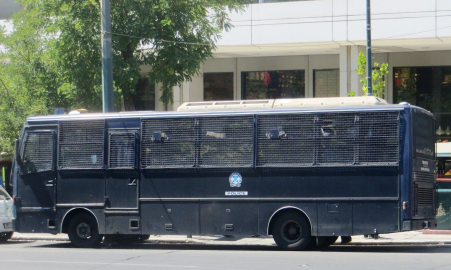
Image 1: Sfakianakis Police Bus
The bus was driven by an officer in a blue police uniform resembling that of the Greek police, and it was escorted by what the respondent described as two police two cars driving in front and behind the bus. At one point there was a lot of traffic and the cars turned on their sirens to pass.
After driving for about one hour, they arrived at a second detention site. This building was a one-storey building that looked quite old and run down. Around it, the respondent recalled a wall with barbed wire on top. The entrance door was described as an average-sized grey metal door. Inside the building, the walls were painted in a light yellow.
Inside that detention site, the respondent encountered approximately 20 officers, most of them were wearing camouflage uniforms, some plain green uniforms and some camouflage pants but civilian jackets as well as four people dressed in black uniforms. Almost all of them were wearing balaclavas. The respondent said that nobody spoke to them at this detention site, and they were not able to apply for asylum. They were however given some water and were allowed to use the toilet, but had to hurry.
After around three hours, some of the officers came into the cell and ordered the whole group to exit the building. The respondent believes that it was around 3 p.m. at this point.
The group of 35-40 was again taken on the same type of blue bus as before, but this time without an escort. This drive lasted approximately three hours and they arrived at another detention site at around 6 p.m. Again, they were ordered to undress and were beaten with batons while undressing. This time, the officers did not return their clothes but only gave them boxer shorts to wear.
At around 8 p.m., after two hours, several officers in plain green uniforms and wearing balaclavas entered the room and ordered the group to follow them. A vehicle was waiting outside the front door. The respondent describes it as a “military transfer vehicle” with metal instead of tarp casing which had a window in the ceiling. All 35-40 people were ordered to get in. The drive lasted for a short time, the respondent estimated about 15 minutes. When they arrived, the respondent immediately recognised that they were back at the Evros/Meric river.
According to the respondent, about 15 officers, most in camouflage uniforms, some in blue uniforms, all wearing balaclavas, most of them carrying batons or metal pipes as well as firearms, were present at the pushback site, as well as at least two men in civilian clothes who were speaking to the group in Arabic with a Syrian accent.
When they had left the car, still only wearing boxer shorts, the group was ordered to undress completely. Reportedly, all of them were beaten with batons while undressing, but some group members who did not comply with this order quickly enough were beaten “too much”. Totally naked, they were searched again, and then the officers ordered them to embark on three blue and grey dinghies that were already inflated when the group had arrived, recalled the respondent. His dinghy was driven by one of the Syrian men while the other kept the group in check. The respondent’s cousin talked to this Syrian man during the drive across the river, asking him why he was working with the officers. The man explained that they receive a “Khartia”, a temporary residence permit, after working for the authorities for three months and that would allow them to travel through Greece without being pushed back and attempt to cross to Albania.
After the pushback, when the group arrived on the Turkish shore, it was around 9 p.m., estimated the respondent – on Sunday, May 9th. Still completely naked, the group walked to the nearest village they could find, around 30min. According to the description, this village might have been Saricaali but the respondent is not certain. They met two men who were wearing civilian clothes but carried walkie-talkies that told the group to go to the Mosque and wait for them there. After a few minutes, the men brought food and clothes, recalled the respondent. The group got dressed and ate some food but soon, a truck resembling a military vehicle arrived at the Mosque and they were all ordered to get in. Two Jandarma officers and a driver were accompanying the group (one officer next to the driver, one in the back with the group). A second car had arrived, carrying two inflatable boats. They were driven for around 10min and arrived at the river again.
There, several more officers were present. The respondent explained that he is not sure how many exactly as it was dark, but he is certain there were more than 10. They explained to the group that they all had to cross back to Greek territory. They ordered the respondent’s cousin and eight other people to embark on one of the two boats they had with them and tied a rope to it which was attached to a tree, described the respondent. The nine people who were ordered to embark on the dinghy were reportedly begging the officers not to be sent back to Greece, but the officers only responded by kicking them. They were given paddles and had to paddle to the Greek shore themselves. Since it was dark and the current took the dinghy far away from the rest of the group and the officers, they could soon not see the boat anymore.
After a short while, the officers started pulling the dinghy back to the Turkish shore with the rope they had tied to it before. When the dinghy came closer, the officers got very angry and the respondent soon realised that it was deflated. He does not speak much Turkish but understood that the Jandarma officers believed that the Greek officers had found the boat and punctured a hole in it in order to prevent more people crossing to Greece. The respondent described how the officers got very angry and started beating the rest of the group with their fists and also kicking them. They had a second boat with them but did not want to use it as they expected it to be destroyed as well. The officers proceeded to take the respondent and the others into the same truck as before and dropped them off between some fields after a 30 minute drive. The group continued walking for approximately 10 kilometers and then found some taxis that were waiting for pushback survivors to take them to Istanbul. The respondent and the rest of his original transit group (except his cousin who had been forced back to Greece) took one taxi and returned to Istanbul where the other people they were staying with paid 1500 TRY to the driver.
When asked if the respondent wanted to add anything, he said:
“We just want someone to tell our story. We want the international community to know what they are doing to us and we hope that we can go somewhere else. Anywhere where it’s peaceful. If it’s Somalia, I don’t care. We just want peace.”
